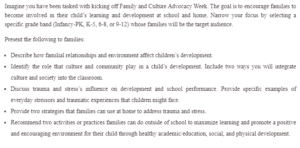Family And Culture Advocacy
How to persuade parents and guardians to become involved in the learning of children in grade level-Pre-K-3
Parents’ and guardians’ involvement in a child’s learning is vital in cognitive development during the early years of preschool. Active participation of parents in the early childhood education process is imperative in ensuring that the children have all the support they require to exploit their full potential (Lara & Saracostti, 2019). Besides, parent and guardian involvement helps extend teaching outside the classroom, thus creating a more positive experience for children, allowing them to perform better in school. It is vitally essential for guardians and parents to support learning in preschool settings and at home.
How the Knowledge of family and environment, particularly culture, connects with parents and how it demonstrates advocacy for the children’s learning.
Family and community members play an essential role in the children’s education process; for example, they act as volunteers in the classroom. Family is the primary resource in children’s education, best exemplified in home learning. The Knowledge of family and environment helps promote home learning that involves a comprehensive set of activities that parents and family members engage in to help their children succeed academically (Uusimäki et al., 2019).
Children often grow up in different cultures and receive specific environmental inputs. As a result, there exist a wide array of cultural variations in children’s beliefs and behavior. Culture, for instance, influences the language development of children. Culture is crucial in determining how children make sense of the world.
The effects of familial relationships and environment on children’s development
Enriching and stimulating familial relationships and environments help foster children’s health and brain development by providing them with love, emotional support, and opportunities for learning and exploration (Uusimäki et al., 2019). Besides, solid familial relationships help ensure adequate economic and emotional resources to support children’s development. Familial solid relationships and networks are vitally important in enhancing children’s development.
Influence of adverse childhood experiences on students’ lives and school performance
Adverse Childhood experiences are one of the biggest challenges that school educators and administrators are tackling. Negative childhood experiences tend to increase a child’s risk of health and social issues, including; reduced cognitive ability, depression, suicide, poor academic performance, and alcoholism (Karatekin & Ahluwalia,2020). These adverse childhood experiences or traumatic experiences that children might face are likely to affect their academic performance significantly.
Recommendation on Activities and practices families can use outside of school to maximize learning and promote a positive and encouraging environment for the children.
There is a need to establish solid school-family partnership strategies to improve children’s performance. This will help promote the children’s positive social, emotional, and academic performance.
Promotion of physical education activities such as sports in schools and inviting families and community members to participate will help promote healthier school environments, thus maximizing learning for the children.
References
Uusimäki, L., Yngvesson, T. E., Garvis, S., & Harju-Luukkainen, H. (2019). Parental Involvement in ECEC in Finland and Sweden. In Nordic Families, Children and Early Childhood Education (pp. 81-99). Palgrave Macmillan, Cham.
Karatekin, C., & Ahluwalia, R. (2020). Effects of adverse childhood experiences, stress, and social support on the health of college students. Journal of interpersonal violence, 35(1-2), 150-172.
Lara, L., & Saracostti, M. (2019). Effect of parental involvement on children’s academic achievement in Chile. Frontiers in Psychology, 10, 1464.
ORDER A PLAGIARISM-FREE PAPER HERE
We’ll write everything from scratch
Question
Family relationships, culture, and community can influence a child’s learning and development. Educators can advocate for students by encouraging parental involvement in the classroom and demonstrating the importance of positive, purposeful relationships.

Family And Culture Advocacy
Imagine you have been tasked with kicking off Family and Culture Advocacy Week. The goal is to encourage families to become involved in their child’s learning and development at school and home. Narrow your focus by selecting a specific grade band (Infancy-PK, K-5, 6-8, or 9-12) whose families will be the target audience.
Present the following to families:
- Describe how familial relationships and environment affect children’s development.
- Identify the role that culture and community play in a child’s development. Include two ways you will integrate culture and society into the classroom.
- Discuss trauma and stress’s influence on development and school performance. Provide specific examples of everyday stressors and traumatic experiences that children might face.
- Provide two strategies that families can use at home to address trauma and stress.
- Recommend two activities or practices families can do outside of school to maximize learning and promote a positive and encouraging environment for their child through healthy academic/education, social, and physical development.
Please provide two references and at least 500 words.

